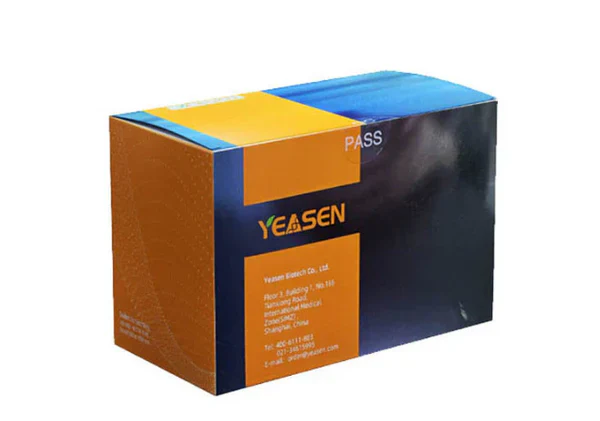Description
Phalloidin is a cyclic heptapeptide toxin derived from the death cap mushroom (Amanita phalloides). It binds to filamentous actin (F-actin) with high affinity (Kd = 20 nM) and does not bind to globular actin (G-actin). It is commonly used to label F-actin in tissue sections, cell cultures, or cell-free systems for qualitative and quantitative analysis. Phalloidin derivatives also bind to actin filaments from both animal and plant sources, including muscle and non-muscle cells, at a stoichiometric ratio of approximately one phalloidin molecule per actin subunit. Non-specific binding is negligible, providing clear distinction between stained and unstained regions. Therefore, phalloidin derivatives are particularly suitable as a substitute for actin antibodies in related research. Additionally, phalloidin derivatives are small, with a diameter of approximately 12-15 Å and a molecular weight of less than 2000 Daltons. Many physiological properties of actin are maintained, such as the ability to interact with actin-binding proteins like myosin, tropomyosin, and DNase I. Phalloidin-labeled filaments can still penetrate solid myosin matrices, and glycerol-extracted muscle fibers can contract after labeling.
Phalloidin binding inhibits the depolymerization of filamentous actin (microfilaments), stabilizing their structure and disrupting the dynamic equilibrium of polymerization and depolymerization. This property reduces the critical concentration (CC) for actin polymerization to less than 1 µg/mL, making it a potent polymerization promoter. Additionally, phalloidin inhibits the ATP hydrolysis activity of F-actin.
Features
Binds selectively to filamentous actin (F-actin).
Phalloidin is not species-specific and exhibits virtually no non-specific staining, providing extremely clear contrast between stained and unstained regions.
It is highly compatible and does not affect the activity of actin.
Applications
The tight and selective binding to F-actin reveals the distribution of microfilament cytoskeleton within the cell.
Specifications
|
Formula |
C35H48N8O11S |
|
Molecular Weight |
788.87 |
|
Appearance |
White lyophilized powder |
|
Purity |
≥96% |
|
Solubility |
1 mg/mL in water |
|
Sequence |
Bicyclic(Ala-DThr-Cys-cis-4-hydroxy-Pro-Ala-2-mercapto-Trp-4,5-dihydroxy-Leu)(S-3 to 6) |
Components
|
Components No. |
Name |
40774ES03 |
40774ES08 |
|
40774 |
Phalloidin |
1 mg |
5×1 mg |
Shipping and Storage
The product is shipped with ice pack and can be stored at -15℃~-25℃.
Documents:
Safety Data Sheet
Manuals
Citations & References:
[1] Shen Y, Xu G, Huang H, et al. Sequential Release of Small Extracellular Vesicles from Bilayered Thiolated Alginate/Polyethylene Glycol Diacrylate Hydrogels for Scarless Wound Healing. ACS Nano. 2021;15(4):6352-6368. doi:10.1021/acsnano.0c07714(IF:15.881)
[2] Yuan Z, Yuan X, Zhao Y, et al. Injectable GelMA Cryogel Microspheres for Modularized Cell Delivery and Potential Vascularized Bone Regeneration. Small. 2021;17(11):e2006596. doi:10.1002/smll.202006596(IF:13.281)
[3] Zhang Q, Liang H, Zhao X, et al. PTENε suppresses tumor metastasis through regulation of filopodia formation. EMBO J. 2021;40(10):e105806. doi:10.15252/embj.2020105806(IF:11.598)
[4] Wu D, Chen T, Zhao X, et al. HIF1α-SP1 interaction disrupts the circ-0001875/miR-31-5p/SP1 regulatory loop under a hypoxic microenvironment and promotes non-small cell lung cancer progression. J Exp Clin Cancer Res. 2022;41(1):156. Published 2022 Apr 27. doi:10.1186/s13046-022-02336-y(IF:11.161)
[5] Wang W, Liang X, Liu X, et al. NOX4 blockade suppresses titanium nanoparticle-induced bone destruction via activation of the Nrf2 signaling pathway. J Nanobiotechnology. 2022;20(1):241. Published 2022 May 23. doi:10.1186/s12951-022-01413-w(IF:10.435)
[6] Sun Y, Zhou Y, Shi Y, et al. Expression of miRNA-29 in Pancreatic β Cells Promotes Inflammation and Diabetes via TRAF3. Cell Rep. 2021;34(1):108576. doi:10.1016/j.celrep.2020.108576(IF:9.423)
[7] Li N, Bai J, Wang W, et al. Facile and Versatile Surface Functional Polyetheretherketone with Enhanced Bacteriostasis and Osseointegrative Capability for Implant Application. ACS Appl Mater Interfaces. 2021;13(50):59731-59746. doi:10.1021/acsami.1c19834(IF:9.229)
[8] Wu J, Zhu J, Wu Q, et al. Mussel-Inspired Surface Immobilization of Heparin on Magnetic Nanoparticles for Enhanced Wound Repair via Sustained Release of a Growth Factor and M2 Macrophage Polarization. ACS Appl Mater Interfaces. 2021;13(2):2230-2244. doi:10.1021/acsami.0c18388(IF:9.229)
[9] Wang W, Qiao SC, Wu XB, et al. Circ_0008542 in osteoblast exosomes promotes osteoclast-induced bone resorption through m6A methylation. Cell Death Dis. 2021;12(7):628. Published 2021 Jun 18. doi:10.1038/s41419-021-03915-1(IF:8.469)
[10] Chen D, Yu W, Zhong C, et al. Elabela ameliorates doxorubicin-induced cardiotoxicity by promoting autophagic flux through TFEB pathway. Pharmacol Res. 2022;178:106186. doi:10.1016/j.phrs.2022.106186(IF:7.658)
Payment & Security
Your payment information is processed securely. We do not store credit card details nor have access to your credit card information.
Inquiry
You may also like
FAQ
The product is for research purposes only and is not intended for therapeutic or diagnostic use in humans or animals. Products and content are protected by patents, trademarks, and copyrights owned by Yeasen Biotechnology. Trademark symbols indicate the country of origin, not necessarily registration in all regions.
Certain applications may require additional third-party intellectual property rights.
Yeasen is dedicated to ethical science, believing our research should address critical questions while ensuring safety and ethical standards.

